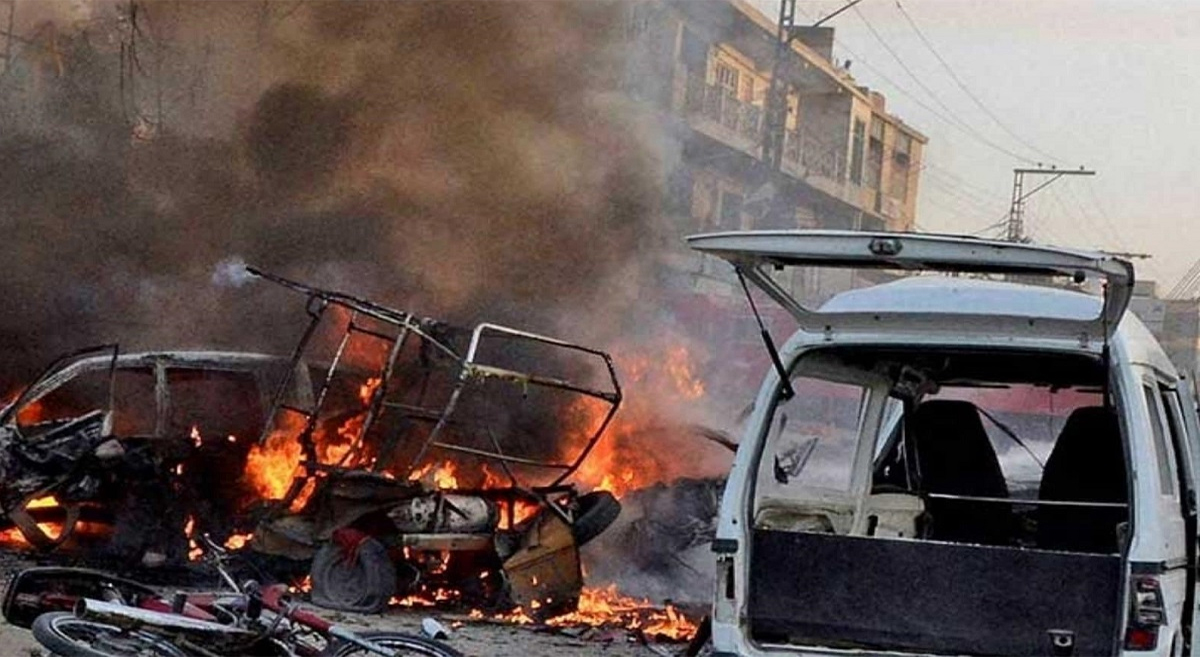International
Pakistan: At Least 52 killed, More Than 50 Injured In Bomb Blast In Balochistan; Visuals Of Destruction Surface

At least 52 people were killed and over 50 injured in a suicide blast near a mosque in Pakistan’s restive Balochistan province on Friday as they gathered to celebrate Prophet Muhammad’s birthday, authorities said.
The explosion occurred near Madina Mosque on Al Falah Road in the Mastung district. No group has claimed responsibility for the attack.
Mastung’s Deputy Superintendent of Police (DSP) Nawaz Gashkori, who was on duty for the rally, was among the deceased.
The explosion took place when people were gathering to mark Eid Miladun Nabi, the birth anniversary of Prophet Muhammad.
City Station House Officer (SHO) Mohammad Javed Lehri said the explosion was a “suicide blast” and that the bomber exploded himself next to DSP’s car.
Lehri said that the wounded are being shifted to a medical facility while an emergency has been imposed in the hospitals.
At least 52 people were killed and over 50 injured in the blast, District Health Officer Mastung Rashid Muhammad Saeed said.
Some of the injured were in critical condition.
Balochistan interim Information Minister Jan Achakzai said rescue teams have been dispatched to Mastung. He added the critically injured persons are being transferred to Quetta and that an emergency has been imposed in all the hospitals.
“The enemy wants to destroy religious tolerance and peace in Balochistan…,” Achakzai said.”The explosion is unbearable.” Caretaker Chief Minister Ali Mardan Domki has directed authorities to arrest those responsible for the blast.
“The perpetrators of the destruction do not deserve any leniency,” he said. “Those who target peaceful processions will be dealt with firmly.” Chief Minister Domki urged the people to unite against terrorism, adding that Islam was a religion of peace and “those who commit such heinous acts cannot be called Muslims”.
The caretaker CM also announced three days of mourning throughout the province over the tragic incident.
Interim Interior Minister Sarfraz Ahmed Bugti also strongly condemned the blast.
Stating that “terrorists have no faith or religion”, Bugti asserted that all resources were being put to use during the rescue operation. He added that no effort would be spared in treating the injured and that terrorist elements did not deserve any concession.
Soon after the explosion, the Punjab police also said that its “diligent officials” were performing security duties for Friday prayers at mosques across the province.
Meanwhile, the Karachi police said that Additional Inspector General Khadim Husain Rind has directed the police to remain “completely on high alert” in view of the Mastung blast.
He directed the policemen to tighten security arrangements regarding Eid-i-Miladun Nabi processions and Friday prayers across the city, as well as to monitor any unusual activities.
Second major blast in Mastung over last 15 days
This is the second major blast that has terrorised Mastung over the last 15 days, Geo News reported.
Earlier this month, at least 11 people were injured in a blast in the same district.
Mastung has remained a target of terror attacks for the past several years with a major attack in July 2018 being one of the deadliest in the district’s history during which at least 128 people were killed, The Tehrik-i-Taliban Pakistan, which set up as an umbrella group of several terrorist outfits in 2007, called off a ceasefire with the federal government and ordered its terrorists to stage terrorist attacks across the country.
Past attacks
The group, which is believed to be close to al-Qaeda, has been blamed for several deadly attacks across Pakistan, including an attack on army headquarters in 2009, assaults on military bases, and the 2008 bombing of the Marriott Hotel in Islamabad.
In January, a Taliban suicide bomber blew himself up in a mosque packed with worshippers during afternoon prayers in Pakistan’s restive northwestern Peshawar city, killing over 100 people.
Last year, a similar attack inside a Shia mosque in the Kocha Risaldar area in the city killed 63 people.
International
Trump doubles down on 10 per cent tariff for BRICS; threatens 200 per cent tariff on pharma

New York, July 9: US President Donald Trump doubled down on his threat to charge BRICS members an additional 10 per cent tariff and alleged that the group was “set up to degenerate our dollar”.
Speaking to reporters as he presided over a Cabinet meeting on Tuesday, Trump said: “Anybody that’s in BRICS is getting a 10 per cent charge” — and that would include India.
On another trade issue that could affect India, Trump said that a 200 per cent tariff on pharmaceuticals would come soon, but added he would “give people about a year, year and a half”.
“We’ll give them a certain period of time to get their act together,” he said about the pharmaceutical companies.
India’s pharmaceutical exports to the US last year was nearly $9 billion.
A reporter recalled that he had said Monday night that trade deal was coming with India soon and asked him about the applicability of the proposed BRICS tariff.
He said: “Anybody that’s in BRICS is getting a ten per cent charge. If they’re member of BRICS, they’re gonna have to pay per cent tariff just for that one thing, and they won’t be a member for long.”
India has opposed a BRICS currency for trade to compete with the dollar and exercised a virtual veto on the proposal.
Laying out India’s policy, External Affairs Minister S Jaishankar said in March: “I don’t think there’s any policy on our part to replace the dollar.”
Affirming the importance of the dollar to the world’s and India’s economy, he added: “At the end of the day, the dollar as the reserve currency is the source of international economic stability, and right now, what we want in the world is more economic stability, not less.”
The letter he sent to BRICS member South Africa on Monday said only that it would face a 30 per cent tariff starting next month, but made no mention of BRICS penalty.
Trump said the BRICS tariff would come “soon”.
Despite India’s so far successful efforts to stop the creation of a BRICS currency, Trump continued to complain about a BRICS conspiracy.
“BRICS was set up to hurt us. BRICS was set up to degenerate our dollar and take our dollar as the standard, take it off as the standard,” he said.
He said that he would oppose it because it would be like losing a war, he said.
“And that’s okay if they want to play that game, but I can play that game too,” he said.
He said he thought BRICS “largely broke up” with only a couple of countries hanging around.
“BRICS is not, in my opinion, a serious set-up,” he said.
But he said that they want to destroy the dollar “so that another country can take over and be the standard, and we’re not going to lose the standard”.
In fact, opposition from India to a BRICS currency is because of the threat of China manipulating it to its benefit.
Business
US tariffs to now take effect from August 1 as trade talks intensify

New Delhi/Washington, July 7: US President Donald Trump’s country-specific tariffs are now scheduled to take effect from August 1, offering a temporary reprieve as trade talks intensified with several countries, including India.
Earlier, the US tariffs were set to take effect from July 9.
Commerce Secretary Howard Lutnick announced the tariff reprieve on Sunday (US time) while speaking to the media. He noted that President Trump was “setting the rates and the deals right now”.
Trump told reporters that “I think we’ll have most countries wrapped up by July 9, either through letters or finalised agreements”, adding that notification letters warning of upcoming tariff hikes would begin going out from Monday (US time), with more expected to follow on Tuesday.
Trump said that sending notices would be much easier than “sitting down and working 15 different things…this is what you have to pay, if you want to do business with the United States.”
In April, Trump announced a base tariff of 10 per cent on most of America’s trading partners and thereafter additional duties ranging up to 50 per cent.
The US has announced trade deals with the United Kingdom and Vietnam so far, with some more trade deals apparently in the pipeline.
“President Trump’s going to be sending letters to some of our trading partners saying that if you don’t move things along, then on August 1 you will boomerang back to your April 2 tariff level. So I think we’re going to see a lot of deals very quickly,” US Treasury Secretary Scott Bessent told CNN.
India’s high-level official delegation led by chief negotiator Rajesh Agrawal has returned from Washington after the trade talks with US officials without reaching a final agreement on the sensitive issue of trade in agricultural and dairy products that the US is pushing for.
Meanwhile, Trump has announced that an additional 10 per cent tariff will be imposed on countries that “align themselves with the anti-American policies of BRICS”.
Business
12 nations to get US tariff letters on Monday, says Trump

New Delhi/Washington, July 5: US President Donald Trump has signed tariff letters on exports from 12 countries, which are expected to be sent out on July 7 (Monday).
Speaking to the media aboard Air Force One, the US President said the names of the countries which will receive the letters would only be revealed on Monday.
“I signed some letters and they’ll go out on Monday, probably 12. Different amounts of money, different amounts of tariffs,” he told reporters.
“The letters are better. It is much easier to send a letter,” Trump added.
Trump has suggested that the reciprocal tariffs could go even higher, potentially reaching 70 per cent for some countries, and take effect from August 1.
The US President in April unveiled a base tariff of 10 per cent on most goods entering the country, along with higher rates for certain countries, including China. Those elevated tariffs were later suspended till July 9.
Washington has concluded trade agreements with two countries – the United Kingdom and Vietnam.
Meanwhile, India’s high-level official delegation, led by chief negotiator Rajesh Agrawal, has returned from Washington without reaching a final agreement with US officials on the sensitive issue of trade in agricultural and dairy products that the US is pushing for.
However, there is still a glimmer of hope that an interim bilateral trade agreement may be reached at the highest political level in the two countries before the July 9 deadline.
The Indian team was in Washington for negotiations on an interim trade agreement with the US from June 26 – July 2.
According to Commerce Minister Piyush Goyal, India will not hurry into signing a free trade agreement under pressure from any deadline.
Speaking on the sidelines of an event in the national capital, Minister Goyal emphasised that India is ready to make trade deals in the national interest but it “never negotiates trade deals with a deadline”.
The US is seeking broader market access for its agricultural and dairy products, which is a major hurdle, as for India, this is a livelihood issue for the country’s small farmers, and hence, is considered a sensitive area.
While India is looking to secure an exemption from President Trump’s 26 per cent tariffs by concluding an interim deal before July 9, it is also pushing for significant tariff concessions for its labour-intensive exports such as textiles, leather and footwear.
-

 Crime3 years ago
Crime3 years agoClass 10 student jumps to death in Jaipur
-

 Maharashtra1 year ago
Maharashtra1 year agoMumbai Local Train Update: Central Railway’s New Timetable Comes Into Effect; Check Full List Of Revised Timings & Stations
-

 Maharashtra1 year ago
Maharashtra1 year agoMumbai To Go Toll-Free Tonight! Maharashtra Govt Announces Complete Toll Waiver For Light Motor Vehicles At All 5 Entry Points Of City
-

 Maharashtra1 year ago
Maharashtra1 year agoFalse photo of Imtiaz Jaleel’s rally, exposing the fooling conspiracy
-

 National News1 year ago
National News1 year agoMinistry of Railways rolls out Special Drive 4.0 with focus on digitisation, cleanliness, inclusiveness and grievance redressal
-

 Maharashtra1 year ago
Maharashtra1 year agoMaharashtra Elections 2024: Mumbai Metro & BEST Services Extended Till Midnight On Voting Day
-

 National News1 year ago
National News1 year agoJ&K: 4 Jawans Killed, 28 Injured After Bus Carrying BSF Personnel For Poll Duty Falls Into Gorge In Budgam; Terrifying Visuals Surface
-

 Crime1 year ago
Crime1 year agoBaba Siddique Murder: Mumbai Police Unable To Get Lawrence Bishnoi Custody Due To Home Ministry Order, Says Report












